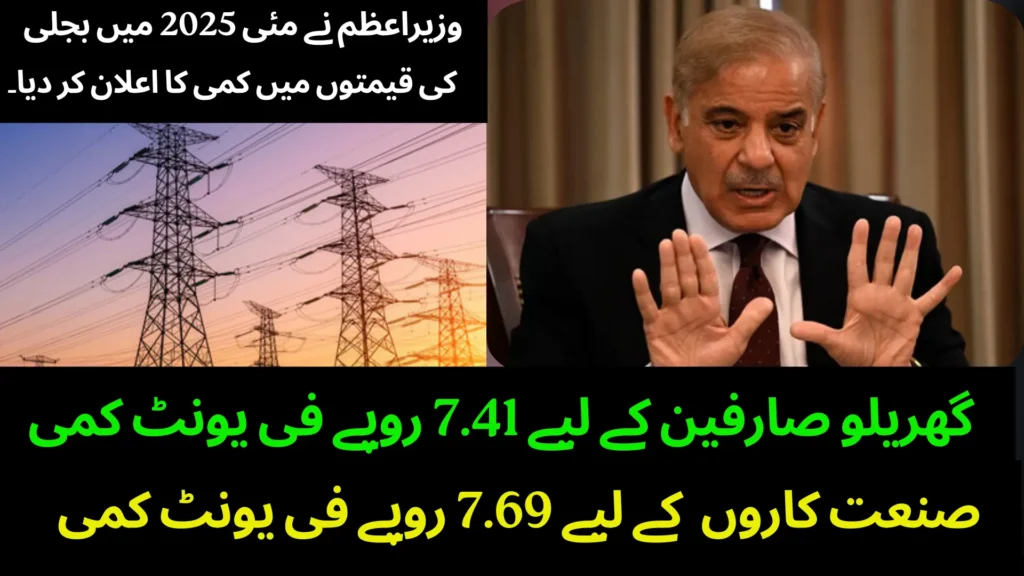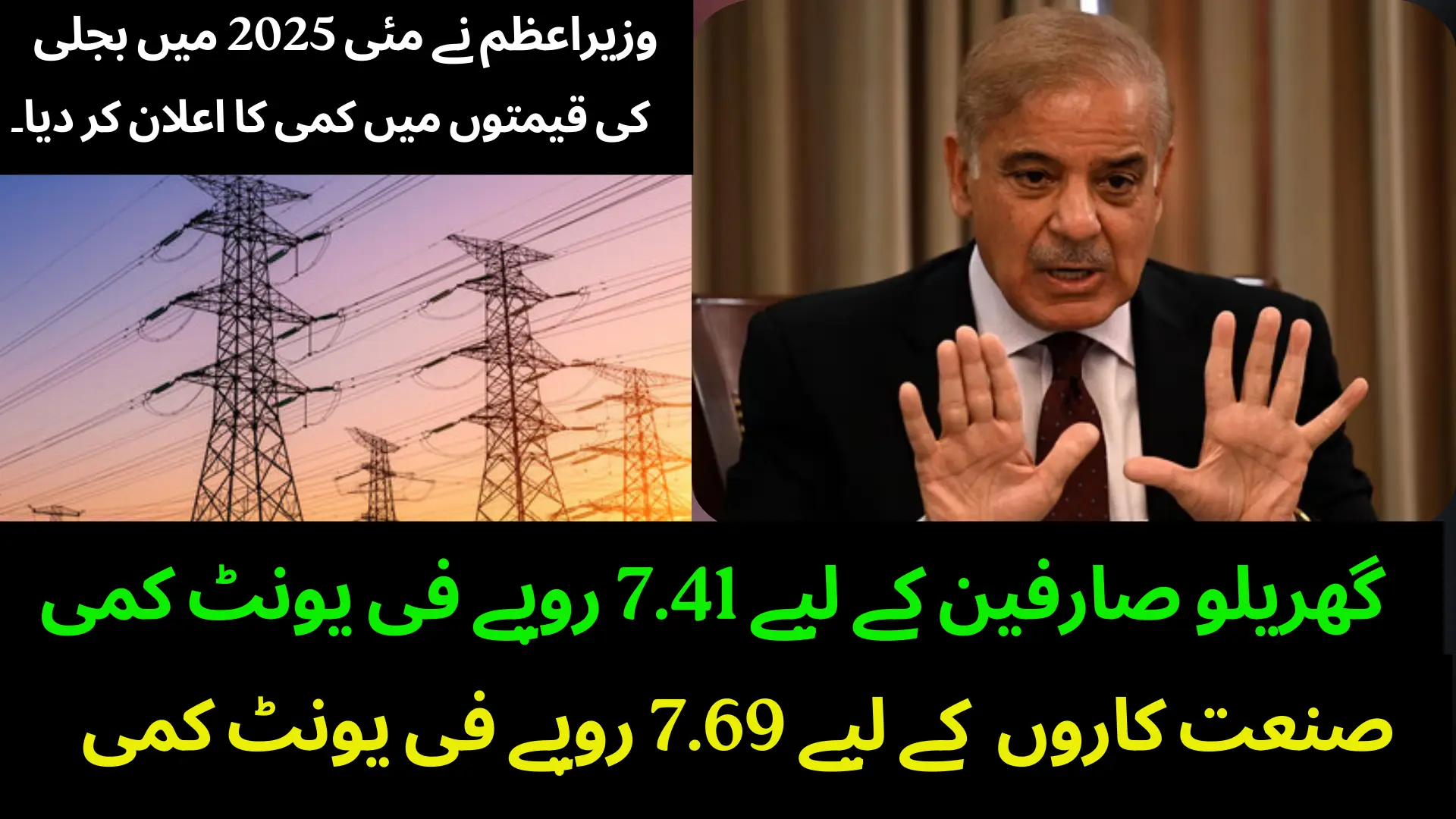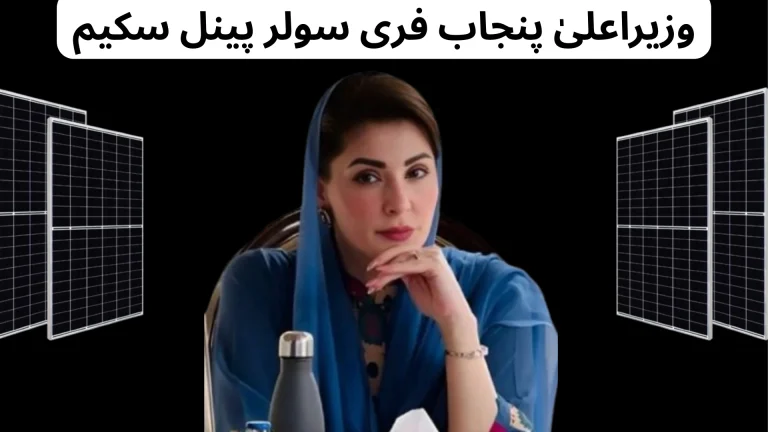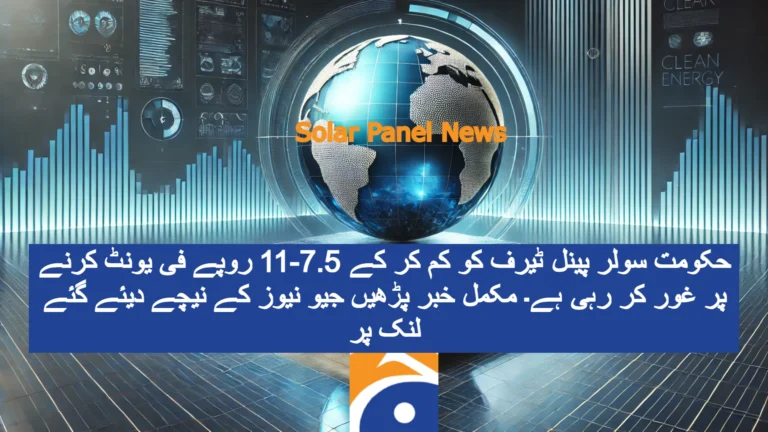Prime Minister’s Electricity Relief
The Prime Minister of Pakistan announced a significant package, the Prime Minister’s Electricity Relief, aimed at reducing the financial burden on households, businesses, and industries struggling with high energy costs. Shehbaz Sharif addressed a ceremony and announced electricity relief of 7.41 PKR per unit for domestic consumers and 7.69 PKR per unit for industrial consumers. Rising electricity tariffs, coupled with inflation, have made power affordability a significant concern nationwide. This initiative is being seen as a vital step toward energy security, sustainable growth, and social support for citizens.
Electricity plays a central role in Pakistan’s economic development, as industries, agriculture, and services all depend heavily on power supply. With this prime minister’s electricity relief package, the government aims not only to ease financial pressure but also to encourage efficient energy consumption, strengthen the adoption of renewable energy, and stabilise the power sector.
All the official details are available on the Ministry of Information and Broadcasting’s official website.
Prime Minister’s Electricity Relief – Features & Benefits
The Prime Minister’s electricity relief package includes multiple components to support different groups.
- Reduction in Tariff for Domestic Users
- Households consuming up to 300 units per month will receive a subsidy.
- Special discounts for Lifeline consumers (those consuming up to 100 units) to protect low-income families.
- Support for Small Businesses
- Small shopkeepers, retailers, and local industries will benefit from fixed tariffs to ensure stable electricity bills.
- Incentives for businesses that adopt energy-efficient appliances and solar systems.
- Relief for the Agriculture Sector
- Electricity rates for tube wells have been reduced to help farmers cut irrigation costs.
- Subsidised solar-powered tube wells promoted for sustainable farming.
- Industrial Competitiveness
- Export-oriented industries are to receive concessional tariffs to stay competitive in international markets.
- Industries are encouraged to invest in renewable solutions with tax benefits.
- Renewable Energy Promotion
- The government is to expand net metering facilities, enabling citizens to sell excess solar power to the grid.
- Incentives for local solar panel manufacturing, along with easier financing options for rooftop systems.
Prime Minister Electricity Relief Impact on Households:
The immediate impact of this relief is expected to be felt by ordinary households. Families struggling with rising bills will see a significant reduction in their monthly expenses. Lower tariffs for small users ensure that electricity is treated as a basic necessity rather than a luxury. This relief also encourages households to adopt energy conservation practices.
Impact on Businesses and Economy
Small businesses are considered the backbone of Pakistan’s economy. Stable, affordable power tariffs will allow shopkeepers and traders to continue operating without passing on rising costs to customers. Similarly, larger industries, particularly textile and manufacturing, will benefit from competitive tariffs. This will help increase exports, create jobs, and support GDP growth.
By reducing input costs, the package aims to improve Pakistan’s industrial productivity. Affordable electricity for agriculture will ensure better crop yields and lower food inflation.
While the prime minister’s electricity relief announcement is widely welcomed, challenges remain:
- Fiscal Pressure: Subsidies require heavy government spending, which can strain the national budget.
- Circular Debt Management: Without reforms in billing and recovery, subsidies may worsen financial gaps.
- Implementation Issues: Ensuring that relief actually reaches deserving households is a big challenge.
- Dependency on Imports: Until renewable projects expand, imported fuels will continue to affect power costs.
Experts argue that the relief package should be paired with structural reforms, such as improved governance of distribution companies, reduced line losses, and increased private-sector investment in power generation.
Prime Minister’s Electricity Relief Benefits
- Reduced Electricity Bills
- Eligible households receive direct discounts on monthly bills, easing financial pressure on families already affected by inflation.
- Support for Low-Income Consumers
- The package provides additional subsidised units for domestic users consuming limited electricity, ensuring affordable access for everyone.
- Encouragement of Solar Energy
- The plan promotes rooftop solar systems by offering easy instalment plans and reduced import duties on solar panels and inverters.
- Business and Industry Support
- Small and medium enterprises (SMEs) get tariff relief to help them manage operational costs and maintain stable production.
- Power Sector Improvement
- The relief program includes reforms in billing transparency, grid maintenance, and loss reduction, helping stabilise the overall energy supply.
Prime Minister’s Electricity Relief – Conclusion
The Prime Minister’s electricity relief package is an essential step toward addressing Pakistan’s long-standing power crisis. By targeting low-income households, small businesses, agriculture, and industry, the package provides short-term financial relief while also laying the foundation for renewable energy expansion.
However, for long-term success, the government must combine relief with structural reforms, efficient governance, and the integration of renewable energy. If appropriately implemented, this initiative could mark a turning point in Pakistan’s energy sector — making electricity more affordable, industries more competitive, and the economy more sustainable.
In short, the electricity relief package is not just about cheaper bills; it represents a broader vision for Pakistan’s energy future in 2025 and beyond.





